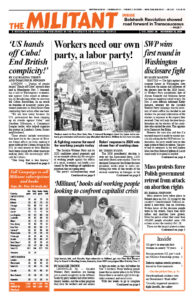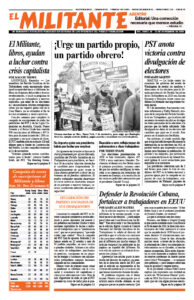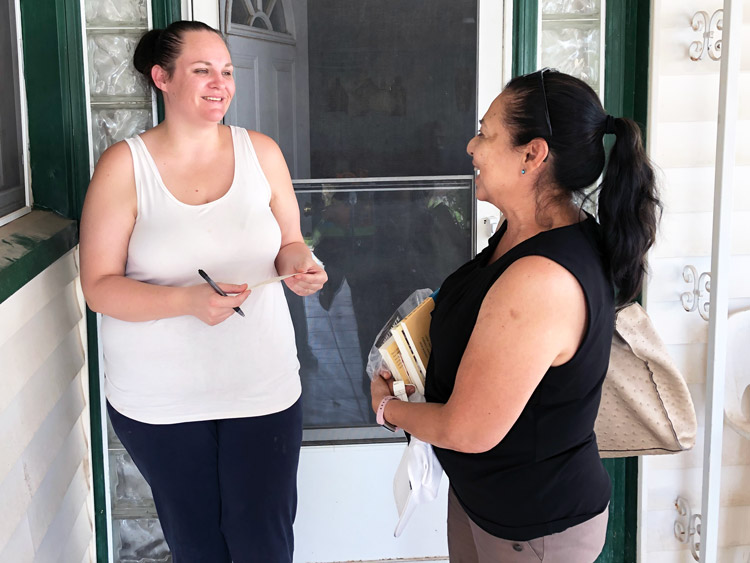KEARNY, Ariz. — Like other workers across the country, miners and others in Arizona’s “copper triangle” are facing an unprecedented economic and social crisis. Over 60% of copper produced in the U.S. comes from the state and despite some mine closings, it is still a big industry here.
Copper is an important component in electric car motors and batteries, and mine bosses and other area capitalists are hoping for big future profits.
During a trip in October to report for the Militant on the outcome of the fight of the United Steelworkers, Teamsters and other unions against union-busting copper giant Asarco, Ellie García and I spoke with nearby Hayden resident Jose Martinez, member of Steelworkers Local 886, about what workers face.
Martinez worked for 10 years at Asarco’s smelter in Hayden. He participated in the nine-month strike against Asarco that ended in July. The company has operations in Hayden, here in Kearney, at two mines near Tucson, and in Amarillo, Texas. The Hayden smelter and concentrator were shut down during the strike and the company refuses to say definitively whether they will open again.
Founded in 1911 as a company town, stores on Hayden’s main street are boarded up. The population has dropped precipitously and abandoned houses are all around. Miners say drug addiction has grown.
Martinez is staying for now, hoping to get his old job back. In the meantime, union assistance is helping workers like him survive.
We told him about the Socialist Workers Party 2020 campaign and how it raises the need for workers and our unions to fight for a government-funded public works program to put millions to work building schools, infrastructure, hospitals and other things workers need. “Working people need to fight for better wages and conditions at every workplace. Going through experiences and struggles together can help in forging a working-class leadership,” García said.
“We need jobs and unions,” Martinez said. “The nearest hospital is an hour away in Globe, over mountain roads. The bridges and roads need work. There is plenty to do.”
We showed Martinez books by Socialist Workers Party leaders drawing the lessons of past union struggles. He decided to get a Militant subscription along with In Defense of the US Working Class by SWP leader Mary-Alice Waters and Teamster Rebellion, a book about the fight in the 1930s that made Minneapolis a union town.
We dropped by Maria’s Cafe in Mammoth to talk with owner Maria Garcia, whose husband Fernando is a miner. During the strike Garcia regularly delivered burritos and other food to miners on the picket line at Asarco’s giant Ray Mine, about an hour away.
She told us of the difficulties small- business owners face due to state-imposed coronavirus shutdowns. At first customers were afraid to even come for takeout. Things have picked up a little, but business is still down.
Challenges under lockdowns
Maria Garcia’s 7-year-old son, who was doing online schoolwork in one of the booths, wants to get back to school, she said. Football has been cancelled for another son, who’s in high school. “After the softball games and other sports, people would gather at the family restaurants and celebrate,” Garcia said. “Now all the young people have is social media. I think we should be able to go to church, given other things that are opening up.”
School budget cutbacks have hit hard in the mining towns. The school in Mammoth has been closed and children are being bused to San Manuel, 15 minutes away. In some towns the school week has been cut to four days. Head Start preschools are being phased out.
“We are for teachers, school workers and their unions taking control of the situation, to work together and involve parents in ensuring schools are operating safely,” Ellie García said. “Churches shouldn’t be discriminated against or treated any differently than any business or other organization.”
When we knocked on the door of Iris Lamb here in Kearny and told her about what the Socialist Workers Party candidates say about the need for workers to fight around jobs, she invited us in. “With a jobs program, we could fix the dams,” she said.
Lamb, who is married to a miner, is pro-union. There’s a long history of hard-fought and bloody battles for union recognition and better conditions by copper miners. But since the bitter union loss in the Phelps Dodge strike in the 1980s, the bosses — backed by the Arizona state government — have pushed the unions back. While miners continue to fight at Asarco and elsewhere, today most of the mines are nonunion.
When we raised the need for the unions and working people to break with the Democratic and Republican parties, Lamb said, “I can see why people voted for Trump, but he only gives lip service to solving the problems. The Democrats look down on workers.”
“Our party says the only way forward is for working people to depend on ourselves,” Ellie García said. “We are a working-class party. We think that out of our struggles, working people will reach the conclusion we need to build our own party, a labor party, with the perspective of taking political power out of the hands of the capitalists.”
“It’s the policies of both the Democrats and Republicans that are responsible for the situation of workers now,” Lamb said.
Lamb, who has four children, said online learning puts parents in an impossible situation. “Parents are supposed to stay by the child and help them. I asked the teacher how am I supposed to do that with two children ‘in school’ in my house, an active 4-year-old and a nursing baby?” she said.
Lamb decided to endorse the Socialist Workers Party campaign, subscribed to the Militant and purchased Teamster Rebellion; Women in Cuba: The Making of a Revolution Within the Revolution; and Are They Rich Because They’re Smart? by SWP National Secretary Jack Barnes.
“Workers in this country have the sheer numbers, so they keep us down and divided,” she told us. “A powder keg is building up. I was just thinking about these things. I can’t believe you stopped by.”


